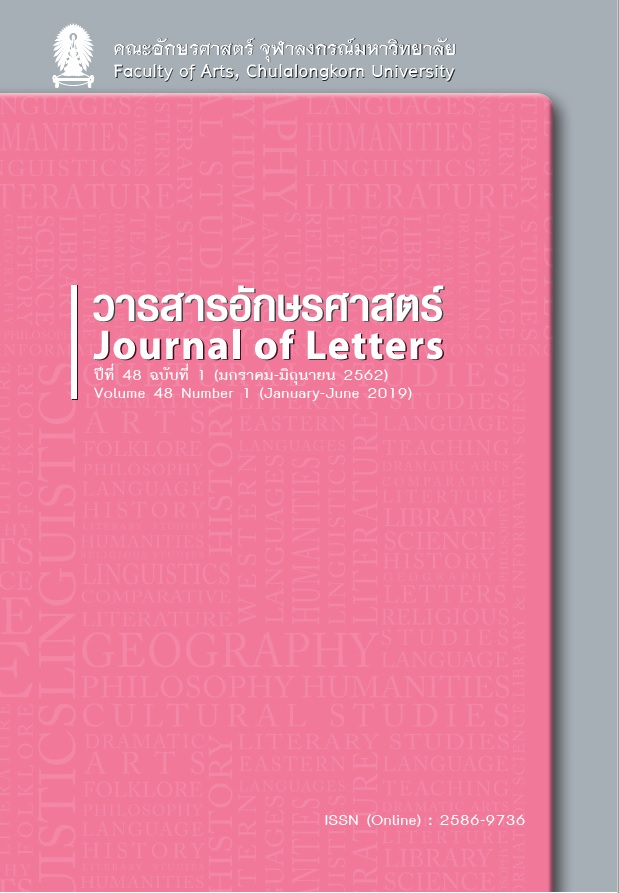Politeness Judgment from Responding to Blame Utterances in Thai:
Perspectives from Two Generations
Keywords:
judgment, politeness, age, teenagers, adults, politeness judgement, generation gapAbstract
To determine whether any action or utterance is polite or impolite is at the discretion of the listener; a speaker may employ utterances that seem disrespectful to an outside audience, but if their immediate listeners did not feel those utterances were impolite, the utterances cannot be regarded as such. However, personal politeness perspectives vary according to the participants' age range. For this reason, an awareness of the participants' view of politeness is important. If people from different generations realize each other’s politeness perspectives, it makes their communication smooth. This article aims to comparatively study the politeness judgment levels of utterances taken from dialogue in TV series in situations where teenagers responded to blame from their parents. The data were collected from two groups of participants: 30 teenagers and 30 adults. The results show that there are differences between the politeness judgements of teenagers and adults, which are reflected in the reasoning behind the judgments. It was found that adults focused on negative behavioral reasons such as emotional expression, controversy, and aggressive expression, while teenagers emphasized giving explanations.
References
Thasanee Mekthawornwathana ทัศนีย์ เมฆถาวรวัฒนา. 2011. Patchai thi Chai nai Kan Tatsin “Kwam Supap” nai Kan Sontana khong Phet Chai lae Phet Ying nai klum Tuayang Radap Udomsueksa khong Thai ปัจจัยที่ใช้ในการตัดสิน “ความสุภาพ” ในการสนทนาของเพศชายและเพศหญิงในกลุ่มตัวอย่างระดับอุดมศึกษาของไทย. [The Factors Used for Identifying “Politeness” in Male and Female Conversations among Thai Undergraduate Students.] Warasarn Pattana Borihansart วารสารพัฒนบริหารศาสตร์ [NIDA Development Journal] 51: 141-166.
The Royal Institute ราชบัณฑิตยสถาน. 2010. Photchananukrom Sub Phasasat (Phasasat Prayuk) Chabup Ratchabundittayasathan พจนานุกรมศัพท์ภาษาศาสตร์ (ภาษาศาสตร์ประยุกต์) ฉบับราชบัณฑิตยสถาน [Dictionary of Linguistics (Applied Linguistics), The Royal Institute Version]. Bangkok: The Royal Institute.
ภาษาอังกฤษ
Brown, P., & Levinson, S. 1978. Universals in Language Usage: Politeness Phenomena. In Questions and Politeness: Strategies in Social Interaction, ed. Esther N. Goody, 56-310. Cambridge: Cambridge University Press.
Brown, P., & Levinson, S. 1987. Politeness: Some Universals in Language Usage. vol. 4. Cambridge University Press.
Carrell, P. L., & Konneker, B. H. 1981. Politeness: Comparing Native and Nonnative Judgments. Language Learning 31(1): 17-30.
Fraser, B., & Nolen, W. 1981. The Association of Deference with Linguistic Form. International Journal of the Sociology of Language 1981(27): 93-110.
Goffman, E. 1967. Interaction Ritual: Essays on Face-to-Face Interaction. Oxford, England: Aldine.
Hall, Edward T. 1976. Beyond Culture. New York: Double Day.
Ide, Sachiko. 1989. Formal Forms and Discernment: Two Neglected Aspects of Universals of Linguistic Politeness. Multilingua-Journal of Cross-Cultural and Interlanguage Communication 8(2-3): 223-248.
O'Dwyer, L. M., & Bernauer, J. A. 2013. Quantitative Research for the Qualitative Researcher. California: Sage Publications.
Downloads
Published
How to Cite
Issue
Section
License
Copyright and plagiarism
Authors are responsible for obtaining permission to use copyrighted materials from copyright owners. Authors are responsible for observing requisite copyright law when quoting or reproducing copyrighted materials. Quotations and reproductions of content from other published sources must be accompanied by a reference and all sources should be clearly listed in the references section. Quotations and reproductions of content from external sources without due attribution could be considered a severe infringement of academic conduct and may constitute a legal offence under the Copyright Act of B.E. 2537. Any legal ramifications arising from the infringement of copyright regulations would be the sole responsibility of the author(s).



